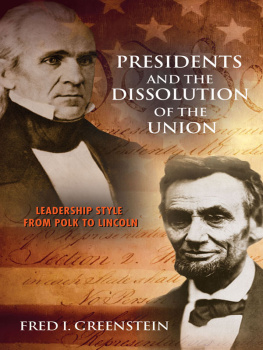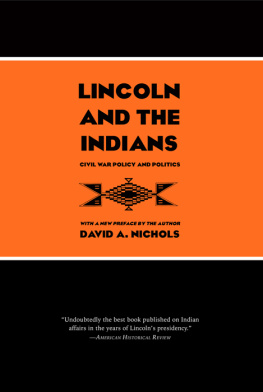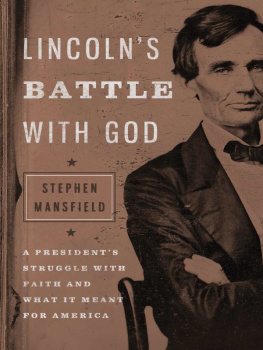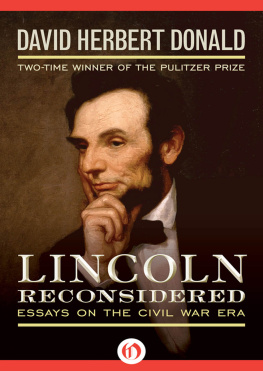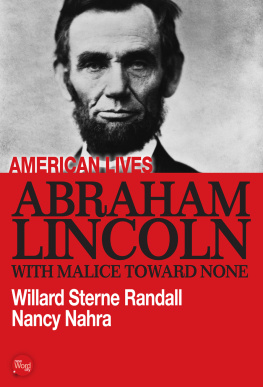The Presidents War
Also by Chris DeRose
Congressman Lincoln: The Making of Americas Greatest President
Founding Rivals: Madison vs. Monroe, The Bill of Rights, and The Election that Saved a Nation
The Presidents War
Six American Presidents and the Civil War That Divided Them
Chris DeRose
For Nolan Davis, mentor and friend, with profound appreciation for the life you made possible, this book is gratefully inscribed by the author.
Copyright 2014 by Chris DeRose
ALL RIGHTS RESERVED. No part of this book may be reproduced or transmitted in any form by any means, electronic or mechanical, including photocopying and recording, or by any information storage and retrieval system, except as may be expressly permitted in writing from the publisher. Requests for permission should be addressed to Globe Pequot Press, Attn: Rights and Permissions Department, PO Box 480, Guilford, CT 06437.
Lyons Press is an imprint of Globe Pequot Press.
Project editor: Meredith Dias
Layout: Adam Caporiccio
Library of Congress Cataloging-in-Publication Data
DeRose, Chris (Christopher)
The presidents war : six American presidents and the Civil War that
divided them / Chris DeRose.
pages cm
Includes bibliographical references and index.
eISBN 978-1-4930-1087-5
1. Lincoln, Abraham, 1809-1865Adversaries. 2. United
StatesPolitics and government1861-1865. 3. Ex-presidentsPolitical
activityUnited StatesHistory19th century. 4. United
StatesPolitics and government1815-1861. I. Title.
E458.D45 2014
973.7092dc23
2014011002
Contents
Would it promote the peace of the community, or the stability of the government to have half a dozen men who had had credit enough to be raised to the seat of the supreme magistracy, wandering among the people like discontented ghosts, and sighing for a place which they were destined never more to possess?
Alexander Hamilton, Federalist 72
Whatsoever God willeth must be, though a nation mourn.
Epitaph of the only civilian killed at Gettysburg
Prologue
In Jacksons Time
April 13, 1830
Browns Indian Queen Hotel
Washington City, District of Columbia
A Toast.
The banquet in honor of Thomas Jeffersons birthday was a splendid one, even by the standards of the national capital, unsurpassed for richness and variety, elegance and abundance. More than one hundred congressmen, leaders of the American military, and members of the presidents cabinet sat at two tables the length of the hall terminating in a perpendicular head table occupied by the president of the United States.
By tradition, the hosts of the gala would share their sentiments, called the regular toasts. Subsequently, volunteer toasts were given in order of standing.
As members of an ascendant political party presiding over a prosperous, growing country, the banqueters should have been enjoying a night of pure celebration. But an uneasy tension hung over the room, perhaps more palpable than the scent of the evergreen branches that adorned the walls. Dividing this once happy family was the doctrine of nullification, the principle that a state could refuse to be bound by national laws with which it disagreed. The tariffs of 1828 and 1832, which boosted northern manufacturers but burdened southern agriculture, gave rise to a movement in South Carolina to veto what was believed to be an unconstitutional policy. The planners of this event had chosen to use it to make a statement. The regular toasts, twenty-four in all, embraced this controversial new doctrine, even seeking to give it Jeffersons imprimatur.
When the regular toasts had concluded, the president of the United States was called on to give the first volunteer toast. Andrew Jackson had listened long enough. Though known as an ardent supporter of states rights, Jacksons remarks would sorely disappoint the nullifers.
Our Union Jackson said it must be preserved.
The presidents toast electrified the country, recollected one senator, who had chosen to stay at the dinner while others walked out. The tough old general had issued a challenge, setting forth the terms of debate in what would become the gravest crisis yet presented to the young Union. Jackson had chosen his words carefully. The day before, he had read a newspaper article alerting him that the nullifiers had hijacked the gala. He drafted three possible toasts and, after consulting with trusted friends, decided on the one that fell among the nullifiers like an exploded bomb! as one biographer put it.
Vice President John Caldwell Calhoun of South Carolina, the leading exponent of nullification, was next in order. He did not shrink from the challenge offered by the chief executive. The Unionnext to our liberty the most dear; may we all remember that it can only be preserved by respecting the rights of the states and distributing equally the benefit and burden of the Union.
Next was the secretary of state, Martin Van Buren of New York. Mutual forbearance and reciprocal concessions; through their agency the Union was establishedthe patriotic spirit from which they emanated will forever sustain it.
Three toasts at the end of a long evening. From the president came the view that the Union was sacred and permanent, paramount to other considerations. From the vice president, the Union was important but subject to the Souths unique standard of liberty, dissolvable in the event that the Union was no longer advantageous. From the secretary of state, a reminder that the Union in its origins and preservation had always been the product of compromise. These divergent perspectives would clash, compete, and come to define the presidency of Jackson and those of his successors, not to be resolved until the close of a great war, some seeds of which were planted that evening at the Indian Queen.
Several days later a South Carolina congressman came to visit the president on his way out of town. Jackson received him with great kindness, offering his hand, and begging him to be seated.
After a brief conversation, the congressman rose to leave. Was there anything the president wished to convey to his friends in South Carolina?
No, I believe not, said Jackson. After a moment, however, the president reconsidered. Please give my compliments to my friends in your state, he said. And say to them, that if a single drop of blood shall be shed there in opposition to the laws of the United States, I will hang the first man I can lay my hand on engaged in such treasonable conduct, upon the first tree I can reach.

But neither Calhouns threat nor Jacksons promise would be tested until another generation. Rather, Van Burens philosophy of compromise would rule the day, in the presidency of Jackson and in that of his successors. Beginning with Van Buren himself, the heirs to Jackson saw the role of president as conciliator-in-chief, containing the elements that threatened the Union, often by concessions made to southern interests. But a surprise victor in a bitterly divided presidential election, at the head of a new political party, would upset the old order of things, and redefine the nature of the presidency.
George Nicolay and John Hay, the young private secretaries of the president-elect, Abraham Lincoln, observed that beneath their bosss quiet demeanor, he was undergoing most anxious and harassing labors. Day by day the horizon of politics gathered gloom, and the theory of secession became the theme of every newspaper and the staple question of his daily visitors.
Next page


